Biochemistry / Molecular Biology
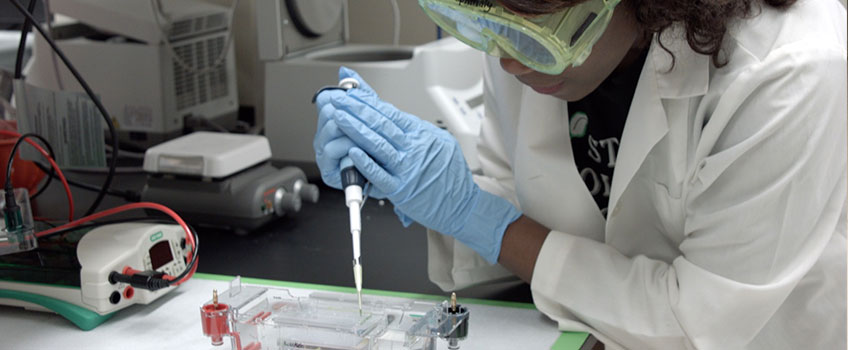
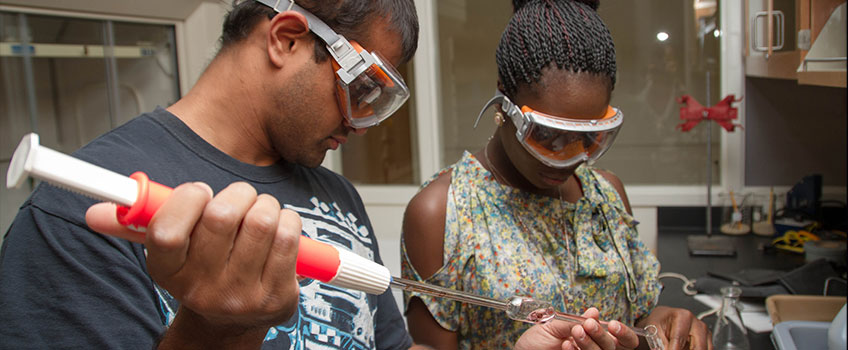
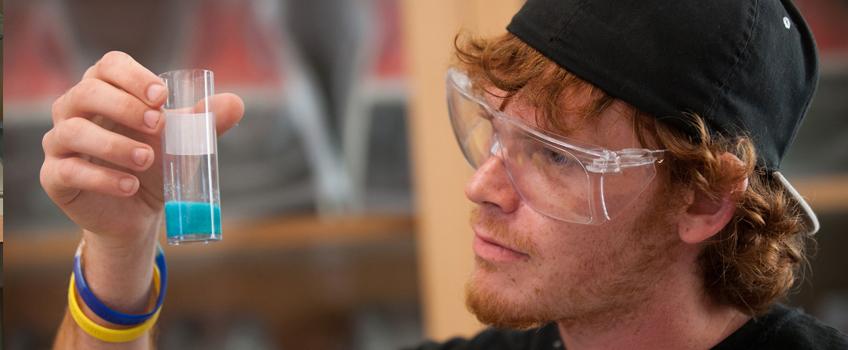
Biochemistry/Molecular Biology (BCMB) represents a rapidly growing discipline that bridges the chemical and biological sciences.
It focuses on how cells solve various biological problems and the role of the chemical components. Knowledge of this field was always necessary for those interested in various professions in the medical field, and it has become increasingly important for those interested in the pharmaceutical and forensics fields.
About the Program
The program offerings, as well as the faculty expertise, reflect the combined chemical and biological basis for this field. Since it is such an experimental science, the program emphasizes laboratory skills, use of instruments, and research skills to prepare students for employment or for study toward a variety of advanced degrees. In addition, an articulation agreement with the Ernest Mario School of Pharmacy at Rutgers allows students the opportunity to earn an advanced degree in pharmacy combined with a baccalaureate degree from Stockton. The American Society for Biochemistry and Molecular Biology has accredited BCMB, and graduating seniors have the opportunity to earn certification by this organization.
Program Features
- Emphasis on the development of laboratory skills.
- All upper level labs are taught by program faculty.
- All undergraduate program which allows for extensive interaction between faculty member and student.
- All students who graduate will have experience with a variety of laboratory techniques, as well as instruments commonly used.
- Students will be able to analyze data, write comprehensively about it and prepare oral presentations.
Additional Information
Program Policies
- Graduation with program distinction
- National exam for BCMB graduates
- Senior Research Project Guidelines for BCMB Degree
- Waiver Procedure
- Instrumentation
- Research
Alumni Highlights
Fishing for Answers: A "Fishy" Tale of Molecular Biology
Learn more about this interdisciplinary collaboration in The Essential Elements article Blending Field Work with Molecular Biology. Be sure to check out other stories about our students and alumni in our current e-zine edition!
Curriculum
The program offerings, as well as the faculty expertise, reflect the combined chemical and biological basis for this field. Since it is such an experimental science, the program emphasizes laboratory skills, use of instruments, and research skills to prepare students for employment or for study toward a variety of advanced degrees. The American Society for Biochemistry and Molecular Biology (ASBMB) has accredited the BCMB major in 2016.
Prospective freshman or transfer students can use the Curriculum & Transfer Equivalency
tool below. In addition, the program degree map provides valuable degree information
and is a guide to assist in planning academic coursework, but should not substitute academic advisement. While we offer both biochemistry/molecular biology
and biology majors, students cannot pursue a double major in biology. A minor in biochemistry
is not a current program offering.
Bachelor of Science in Biochemistry/Molecular Biology
Exploring this field can unlock diverse career paths spanning research and development, biotechnology, pharmaceuticals, healthcare, and government sectors.
Degree Works Curriculum & Transfer Equivalency Tool
To see the curriculum for your area of interest, you’ll use the web program, Degree Works. This service is accessible even if you are not currently a student with Stockton University.
Current students exploring the various paths towards degree completion should access the "what if" option in their Degree Works through the portal.
Instructions on How to Use Curriculum ToolThe Biochemistry/Molecular Biology program has a full, 7-year accreditation from the American Society for Biochemistry and Molecular Biology.

Dual Degree Pharmacy Program
Articulation agreement with Ernest Mario School of Pharmacy
For those students seeking to go to pharmacy school, Ernest Mario School of Pharmacy at Rutgers University and Stockton University have an articulation agreement. The program is intended for students in the senior year of high school who want to go to pharmacy school and meet various requirements. These students apply for admission to Stockton general application as well as an application for the articulation agreement, and if accepted, come to Stockton to complete prerequisites. Students have the choice of majoring in Biology and taking 3 years to complete requirements and prerequisites, or majoring in BCMB with a choice of 2 or 3 years. After four semesters at Rutgers, the students earn a B.S. from Stockton, and after eight semesters at Rutgers earn the doctoral of pharmacy degree.
Faculty
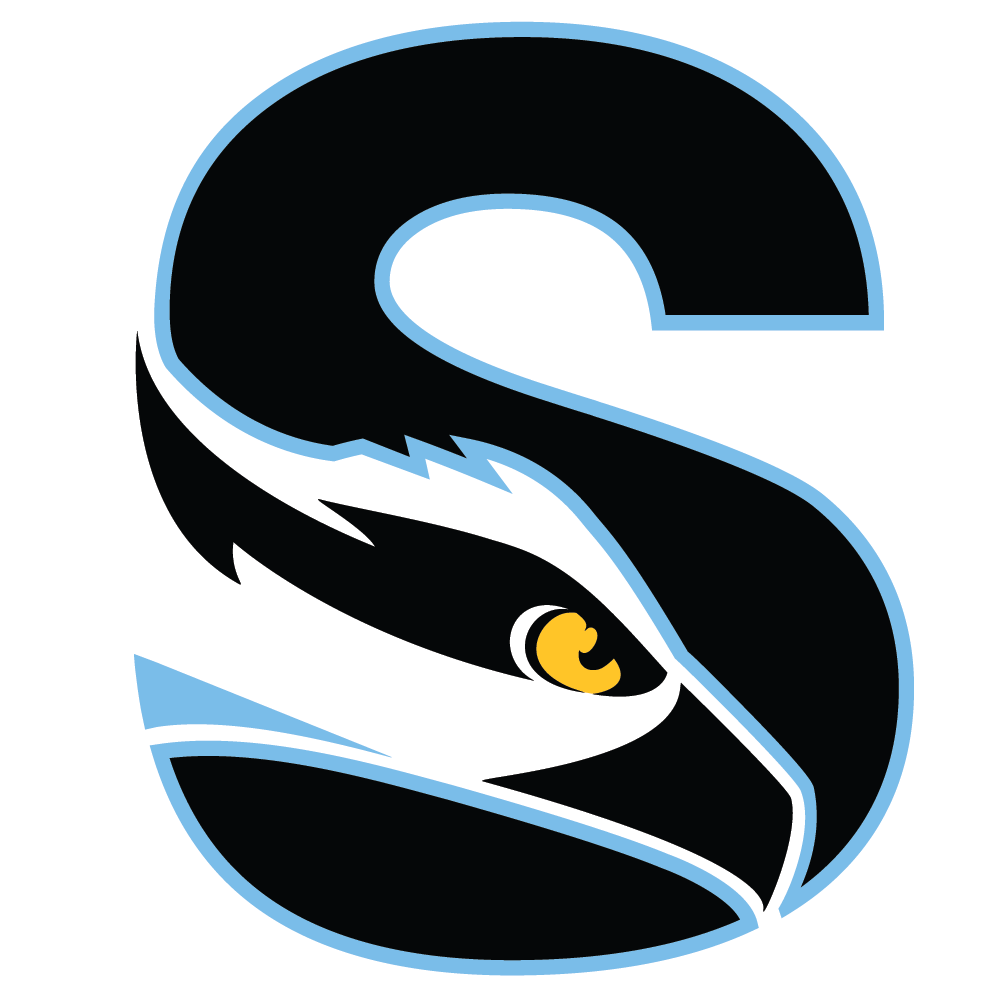
Elizabeth Pollock

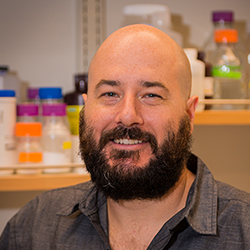
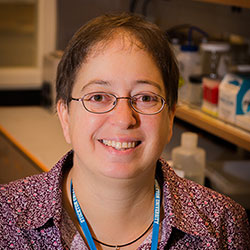

Jennifer Martin

Peter F. Straub
Opportunities
For the senior research project, students have the opportunity to carry out research on campus in the laboratory of a faculty member. This might result in the publication of work as well as presentation at a conference. There are several sources of financial support for students to attend conferences. For the senior internship, students may choose to perform off-campus work in government, university or industrial laboratories.
Examples of these have included regional internships at the Federal Aviation Administration Technical Center and State Police Crime Lab, as well as research projects carried out by students through the National Science Foundation Research Experience for Undergraduates program. Students can apply for this program and be paid a stipend to carry out a research project at a university. In addition, Stockton’s Washington Internship program offers opportunities for placement in institutions such as the National Institutes of Health, National Science Foundation, and the Walter Reed Army Medical Hospital. Academic credit will be granted for such experience, provided it contributes significantly to the student’s intellectual development. An outstanding opportunity is participation in Stockton’s International Education experience. Stockton also has an articulation agreement with the Ernest Mario School of Pharmacy at Rutgers University so that students can complete courses in the BCMB major for two or three years and then transfer to Rutgers. Students apply and are accepted into this program directly from high school and earn a B.S. degree in BCMB from Stockton and a Doctor of Pharmacy degree from Rutgers.
Careers
Students who earn degrees in this field have a variety of options for employment or higher education. They can pursue careers in the pharmaceutical, forensics, or biotechnology industries. Other graduates have also gone on to become teachers. Students with a degree in this field could also pursue advanced study in Medicine, Dentistry, Veterinary Medicine, or complete graduate degrees in Microbiology, Cellular Biology, Biochemistry, or Molecular Biology.
Potential Careers
There is a wide variety of jobs within biochemistry and molecular biology.
- Agricultural scientist
- Beer and wine maker
- Bioethicist
- Bioinformation
- Biological and medical illustrator
- Biomedical researcher
- Bioremediator
- Biostatistician
- Biotechnology researcher
- Environmental attorney
- Environmental scientist
- Epidemiologist
- Food and safety expert
- Forensic scientist
- Genetic counselor
- Government health official
- Grant administrator
- Patent attorney
- Pharmaceutical researcher
- Pharmacist
- Physical therapist
- Physician
- Physician's assistant
- Professor
- Public health administrator
The Student Career Center is available to guide you through your career development journey - from CV writing, interview prep, or general guidance.
American Society for Biochemistry and Molecular Biology (ASBMB) Professional Development
Exploring careers in biochemistry and molecular biology. A resource for undergraduates.



